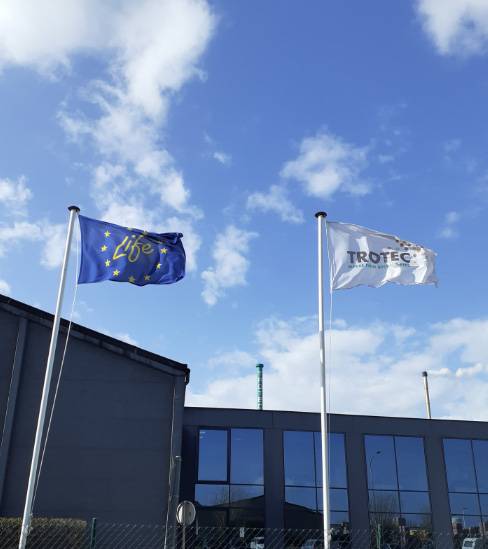
About LIFE F3 : action plan & midterm results
Project Objectives
LIFE F3 aims to demonstrate, validate and industrially roll out new technologies in order to increase the amount and types of food waste that can be recovered and transformed into ingredients for animal feed. This project will support transformation of difficult to process food waste ( such as packaged food waste ) to high value feed and will demonstrate and optimize unpacking and processing activities.
LIFE F3 is a transnational project between Belgium and France. During and after the project, the new technology will be rolled out both in Belgian and French plant of Trotec and new locations and countries will be targeted to set up the new technologies. Furthermore, during the project new partnerships will be set up to extend the amount and type of food manufacturers/retailers that can make use of Trotec’s services and to extend the use of the transformed food waste to other feed industries such as insect feed and pet food. These activities will ensure the sustainability and replicability of LIFE F3
To reach these objectives, a detailed action plan will be implemented :
- High-throughput, automated unpacking lines will be developed. Demonstrations will mainly be focused on food waste streams that are difficult to unpack such as sticky products, frozen food and foodstuff with non food gadgets.
- This action will focus on optimizing the thermal treatment process of challenging former foodstuff on industrial scale. Demonstrations will be focused on 5 different types of waste streams : products with high density, sticky products, fruit processing byproducts, products with low dry matter and products with pit, seeds and nuts. During the demonstrations insights will be gained on the adaptations needed for an optimal thermal treatment.
- To increase the overall sustainability of the project, a new industry 4.0. IT monitoring system will be implemented.
- To maintain the project results after finalisation and to continue research and developments , a targeted marketing and dissemination strategy will be rolled out.
- A replicability and transferability plan will be developed allowing the multiplication of the project results
- A Life Cycle Assessment ( LCA ) and a Socio-Economic Analysis ( SEA ) will be executed
- Relevant information on key project level indicators will be collected during and after the LIFE project. The progress will be communicated on the project’s website
- The dissemination activities aim to spreading information concerning project objectives, industrial results and environmental/socio-economics impacts
- A plan for cross communication and information exchange will be defined, executed and monitored.
Time table
Expected Results
- Demonstration of high-throughput automated unpacking lines. The packaging material will be separated in three streams and valorized to the maximum extend. Those three streams are cardboard ( recycled to clean cardboard ), plastics ( to new foil applications ) and high caloric waste ( to cement pellets, pyrolysis )
- The processing of challenging streams must result in a uniform high quality feed for feed blend, conform to all safety, legal and environmental standards.
- To saveguard continuation, replicability and further dissemination, gathering knowledge and liase with new stakeholders interested in sustainable proteins ( insect feed and Pet food ). To increase supply of challenging food waste streams, new contacts with food processing companies and retail industry will be established. Promotion material and attending conferences will result in increase awareness towards general public and government.
- Data generated by our optimized industry 4.0. IT system will be shared with food manufacturers, enabling them to take targeted actions to reduce/prevent food waste.
- By using former foodstuff for feed blend, an annual saving of C02, reduced water consumption and saving agricultural field.
Achieved Results on midterm project evaluation
- An intensive test program and a detailed study has been done for the unpacking of challenging packed goods. We successfully upgraded our production lines whereby we reached an unpacking capacity on industrial scale. However further test must still be done on specific packaged goods such as frozen food. Also further tests will be executed in function of the availability of received goods.
- We successfully used our production pilot line in France testing the thermal treatment of the challenging former foodstuff. Thanks to the test results achieved in the first half of the project, the company is confident to be able to manage the industrial scale demonstration in a controlled way.
- By monitoring and weighing food waste, interesting data has already been collected and will create awareness at the food manufacturers on waste generation and waste reduction.
- Towards public awareness and dissemination results, the company have done a lot of efforts to spread the appearance of the project. The company distributed journals informing the market about our end product, we participated at two exhibitions in France where we received an award for our innovative new product. Articles were published in different international magazines.
- Promotional material as banner and notice boards have been used for dissemination of the LIFE projects.
- The project management team monitored the project progress and results. All issues and problems were evaluated directly and correction and additional actions were implemented. The midterm targets are reached.